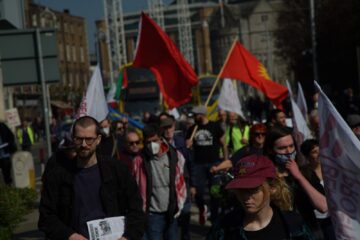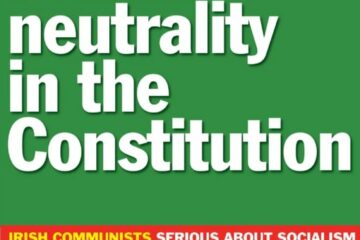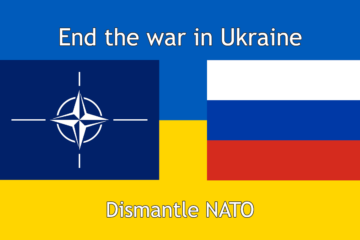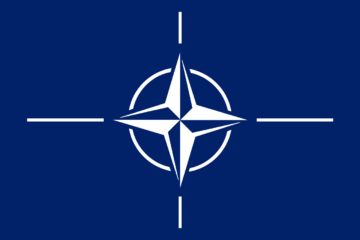25 July 2015
The National Executive Committee of the Communist Party of Ireland at its meeting in July discussed the political and economic situation in the context of events now unfolding within the European Union resulting from the imposition of the new memorandum on the Greek working class. The meeting also stressed the importance of building working-class resistance within Ireland and throughout the EU.
In relation to events in recent weeks the CPI once again expressed its solidarity with the Greek working class and the Communist Party of Greece (KKE), whose principled stance regarding the nature of the forces contained within the SYRIZA party and government has been vindicated, showing that SYRIZA’s strategy could only lead to the present situation. It is clear that the KKE’s steadfast opposition to the European Union and to the previous memorandums has played a central role in the resistance of the Greek people. The KKE has offered clear and unambiguous leadership to the Greek working class; it has also been vindicated in its opposition to the referendum, showing that the choice offered between Yes and No was a false choice to fool the people.
The dominant opportunist forces within SYRIZA never had the will to consistently oppose the European Union. They peddled the illusion that somehow they could talk reasonably to the “institutions” and appeal to their better nature. Most importantly, they showed no political understanding of the class nature of the European Union and the economic and political forces it was established to promote and protect. Their generating of false hopes and their inevitable abject surrender have left the Greek people even worse off than before.
The role of the Irish government at the meetings of heads of government and meetings of finance ministers exposed their slavish commitment to the European Union and showed that this state is a client state of the EU. No semblance of sovereignty or independence is left.
What lies exposed is the bankruptcy of social democracy in its various guises, both new and old. Current events lay bare the illusions of those who believe they can somehow transform or reform the actually existing EU into something else. The real economic and political driving force at the heart of the EU—monopoly capitalism, in particular finance capital—is exposed for what it is. Those not still labouring under the illusion that the EU is some benign force are beginning to question its legitimacy. This questioning of its legitimacy can only grow in the coming period; next they must question its invincibility.
The actions of the EU are not the actions of brutish individuals but real class power brought to bear against the Greek people, to send a clear message to other European workers, particularly those in the heavily indebted countries, that there is no other way, and that no way will be tolerated other than what European monopoly capitalism demands, that the debt and the euro itself are the straitjacket and disciplining mechanism for imposing political and economic control and conformity to the will of the dominant economic powers.
The recent announcement by the Irish government that it will institute tax cuts in the next budget is nothing more than a re-election ploy to placate the business and professional sectors. Its aim is to revive the illusion of permanent upward mobility for those same interest groups.
With the completion of the privatisation of Aer Lingus, the final piece of the jigsaw is the selling of the government’s share, marking the continuation of the strategy of privatising important and strategic public companies and assets.
There will be no increase in spending on the collapsing health service or on education. More than 17 per cent of all tax revenue now goes to service the national debt, now almost €8 billion a year—a debt that does not belong to the people.
Regarding the struggle against water charges, the party reaffirms its support for non-payment and for the broadly based Right2Water campaign, and welcomes the fact that nearly 60 per cent of the people have not paid. The party again reiterates its call for the intensification and reinvigoration of the grass-roots struggle, both in opposition to the installing of water meters and in the non-payment campaign, as essential for ending water charges and ensuring a constitutional amendment that will enshrine the public ownership of this valuable resource. This would be a significant defeat for the Irish establishment and the European Union.
The party also welcomes the decision by the delegates to the ICTU delegate conference to oppose water charges and to support the demand for a constitutional amendment on the public ownership of water. The purpose of the setting up of Irish Water as a separate company was to enable the ultimate privatisation of water. Only a constitutional amendment can prevent this.
The ICTU must now translate a paper resolution into concrete action and support for the R2W campaign and must support the communities that have sustained the campaign thus far. The party also calls on activists not to be distracted from the central task of defeating water charges by the electoral ambitions of different groupings or parties and opportunist individuals. The party also welcomes the adoption of a resolution opposing TTIP, which also needs to be translated into a vigorous public campaign of opposition and the education of workers regarding the dangers posed by TTIP.
The recent budget presented by the British Conservative government and the announced £12 billion package of cuts in welfare spending will hit working people, the working poor and the unemployed hard in the North. It will have a disproportionately higher impact because of the reliance on welfare benefits. These spending cuts will be a blow against an already peripheral regional economy, with adverse effects on consumer spending and on retail industry.
The CPI draws attention to the fact that working people who are employed but live in social housing will see their rents increase to the level pertaining in the private sector, with those receiving sickness benefit having their benefits reduced to the equivalent payment made in the jobseeker’s allowance.
Another example of the peripheral and precarious nature of the dependent economy is the fact that approximately 18 per cent of households in the North receive child tax credits, compared with 13 per cent in Britain. The Northern economy has a higher proportion of young people, and the new “youth obligation” and the removal of grants for students from low-income families will have a disproportionate effect on working-class youth. These renewed attacks on social welfare are coupled with and linked to the new anti-union laws recently proposed by the British government. The party expresses its solidarity with the British working class and with trade unions in the North of Ireland, which will also be greatly affected by these anti-worker laws. The party also reiterates its long-held position of opposition to sectarianism and condemns the violence surrounding this year’s Twelfth of July marches. It again calls on all paramilitaries to cease their activities and desist in their efforts to reignite their failed military strategy.
It is clear from events both here in Ireland and throughout Europe that there is a need to build the people’s resistance, north and south. The struggle against imperialism in all its forms and its domination of our people has to be built throughout the country.
The deepening economic crisis of imperialism is beginning to expose its real nature, and more and more people are now beginning to question the system itself. This presents new challenges and demands for those forces committed to radical economic, political and social change. Working people need to develop a clear strategy for defending themselves against the onslaught on their conditions, for going over to the offensive and bringing this moribund oppressive system to a close.










